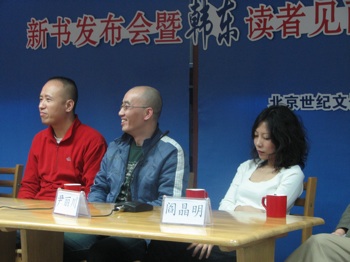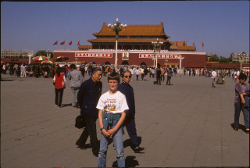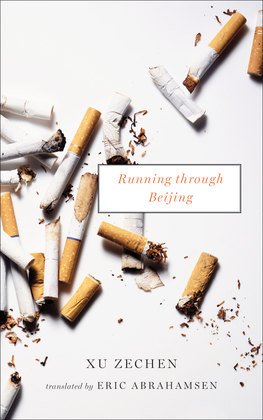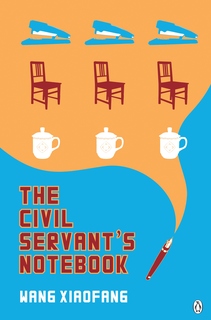Posts
By Eric Abrahamsen, April 27, '08
[Note: the research I mention here was used for an article titled Broken in Words Without Borders]
I’ve been doing some background reading on the Duanlie (断裂, ‘Broken’ or ‘Split’) literary movement, something Zhu Wen instigated in 1998. It was an important, if low-profile, attempt to voice dissatisfaction with the literary establishment (academia, the Writers Association, the literary journals), and to remind authors that they were not alone in their frustrations. Over the course of several years and a series of Duanlie publications (put out by the Shaanxi Normal University Press), the movement did much to foster independence and diversity among the newer generations of Chinese writers.
Duanlie started as a list of questions which Zhu Wen, Han Dong and a few others mailed around to 70 Chinese writers, 55 of whom responded. They were leading questions, questions meant to snap writers out of their diffidence and goad them into defiance, a call for a vote of no-confidence in modern Chinese literature. Through the good graces of Lü Zheng I was able to get my hands on a copy of a book called Duanlie, published in 2000, which contains a series of interviews with the authors most closely associated with the movement: Wei Hui, Chen Wei (one of the writers responsible for the Heilan website), Huang Fan, Gu Qian, Li Xiaoshan, Wu Chen, Zhao Gang, Liu Ligan, Zhu Zhu, Lu Yang, Chu Chen, Han Dong and Zhu Wen. The book also contains the thirteen original questions, which I’ll translate below. I’m leaving the answers out: there are many, and they are predictable.
More…
By Eric Abrahamsen, April 25, '08
We here at Paper Republic strive to bring you the latest and greatest in Chinese language usage, and we’d be criminally unhip if we failed to alert you to the most recent Really Cool Thing on the internet: 囧.
This little beauty is pronounced jiǒng. It is a very old character, appearing on turtle shell inscriptions (甲骨文) from thousands of years ago; while it has many meanings, the most basic is light coming through a window, rather evident from its shape. The more leet among you, however, will note that its also shaped rather like a frowny face: that’s right, 囧 is the hip new way of saying 郁闷 (yùmen, to be bored or depressed or down). Can you feel the grandeur of 5,000 years of history? Read on for advanced usage.
By Eric Abrahamsen, April 21, '08
After an evening spent sipping Qingdao and grumbling about the low profile of Chinese literature abroad, we're generally forced to concede that baby steps are the only practical solution to the problem. There's a chicken-and-egg dynamic going on with publishers – they won't publish a book in translation if the author has no name recognition, but without publication authors have precious little means of getting recognized. Realistically, what's needed is a slow-drip campaign of small-scale publication, word of mouth, and literary journalism. It will be slow, but it's the only way that the attention of publishers and readers can be drawn to a wider selection of Chinese fiction.
So it's good to see two recent advances in that campaign. First was the Olympic Voices from China issue of Words Without Borders: a collection of translated short stories drawn heavily from some of China's better female writers: Sheng Keyi, Ye Mi, Liu Sola and others. Not all of the translations are top-notch, but it's good to see these writers represented. Sheng Keyi's Little Girl Lost got good treatment; you can hear the strangeness of her Chinese in places: "Ripples spread from the doorframe as water slid back from both sides, showing off the bright slickness of his skin."
The other is a books issue of Public Radio International's The World program. The contributions are knowledgeable, ranging from an article on China's Nobel Prize complex, to a review of Zhu Wen's I Love Dollars, to an interview with Yu Hua. Our Cindy and our Brendan are in there too!
I suppose only incremental progress is real progress…
By Eric Abrahamsen, April 8, '08
The pre-dinner hour at Moganshan was often given over to talks and presentations by various course participants; the group leaders one evening, the writers the next. These presentations could be eye-opening in terms of the widely-varying approaches people take to this business – Bonnie McDougall and Howard Goldblatt, for instance. There was almost a kind of glee in the way Bonnie described her translations: leisurely, considered, I think she even described herself as spoiled in being able to pick and choose, freed by her position at the Chinese University in Hong Kong. Howard, on the other hand, was very much the harried professional man, and talked of funding and negotiations, work he'd taken to make the rent. Bonnie goes patiently from beginning to end; Howard generally starts somewhere in the middle and jumps around. Howard hates the second draft more than anything; Bonnie goes and reads a book until the aha! moment comes.
More…
By Eric Abrahamsen, April 7, '08
With all the excitement going on these days, staying home and translating the words of dead authors can feel a little irrelevant, if not actually escapist. I'm neither a Qing historian nor a diplomat, so won't stray too far from my comfort zone of language and literature, but I do think there's something to be said about the Chinese responses of rage to the reporting of the foreign media.
More…
By Eric Abrahamsen, March 28, '08
"PEN believes there are currently 38 writers and journalists imprisoned in China for exercising their right to speak and write freely, as guaranteed under Chinese and international law. We are concerned that, despite official pledges to respect essential rights in this Olympic year, Chinese authorities continue to harass and detain writers in violation of their right to freedom of expression."
By Eric Abrahamsen, March 28, '08
The night of March 23, a Sunday night in the brand-new Grand National Theatre, where the National Centre for the Performing Arts was putting on a version of Puccini's Turandot. Ping, one of the emperor's three ministers, stands forward to lament, "O China, o China, che or sussulti e trasecoli inquieta" ("O China, O China, now always startled and aghast, restless"), and what comes up on the Chinese subtitle screen? "O World, O World, now always startled and aghast…"
Because we've become fragile to the point where words of a fictional character in a Western opera written in 1920s are sufficient to bring us down. Or are our national feelings so easily hurt? Or is it part of the gentle campaign to blur the edges of things, to recast what's seen and heard in a way that leaves a false impression, while stopping short of out-and-out dishonesty?
Funny how these little things can touch off the rancor you've otherwise kept well in check…
By Eric Abrahamsen, March 28, '08
The arena: The second floor of the Baiyun Hotel, an enormous official meeting hall some of us have dubbed the Great Hall of the People, complete with velvet curtains, raised podium, and (apparently) refrigerated wooden chairs.
The contestants: Jiang Rong, author of Wolf Totem, and Howard Goldblatt, translator of that novel into English.
The grudge: Billed as a conversation between translator and translatee, the event was actually a chance for Jiang Rong to air his grievances about Howard Goldblatt’s translation. The two are actually pretty chummy, but neither was averse to a little dustup – Goldblatt started off by essentially leaning back, folding his arms, and saying “do your worst”.
More…
By Eric Abrahamsen, March 20, '08
The awards are out! PEN has announced the recipients of the 2008 awards; China is represented by Andrea Lingenfelter, who won a grant to translate Annie Baby's Padma, "the story of two disaffected city-dwellers who set out on a quest-like trek in a rugged and remote area of Tibet." No publisher has picked this up yet, but word is the award itself has generated a lot of interest. Congrats!
By Eric Abrahamsen, March 20, '08
The first thing you learn from group translation is how vital privacy ordinarily is to this kind of work. Laboring in solitude, in whatever state of disarray or distraction you please, is a luxury – and something of a necessity. As a general rule the first three drafts of anything are execrable, and being able to drown those drafts in the confidence that no one will ever know they existed provides such peace of mind. Silly ideas surface and subside without being much exposed to the light of rational judgment, and the final forms of things are gently extracted from this unarticulated mess.
It’s alarming, to say the least, to be given a chunk of a Chinese novel and asked, “So, how would you translate that first sentence?” while everyone in the room watches you. I think we all started out more or less aghast that we’d be asked to perform, in a sense – if we were comfortable with that we’d have gone into interpretation. But, of course, there are salutory things about this public disrobing – most immediate is the way it zaps your emotional investment in your translation. You stammer out something far, far inferior to what you might have produced had you been sitting alone at your own desk in your boxer shorts, and then everyone in the room tears it apart. Three rounds of that and you no longer regard your words as your own. Which, of course, they weren’t to begin with.
We’re doing about six sentences an hour on Tie Ning’s Dayunü (大浴女), chewing over every article and preposition, dueling for adverbs, and the main lesson so far has been one I’ve learned over and over, and will probably continue to learn until I give up on this altogether: You’ve never thought hard enough about what you’ve written.
By Eric Abrahamsen, March 18, '08
Today is day one of the Sino-British Literary Translation course. After a very raucous train ride from Beijing to Shanghai we boarded a four-hour bus to Moganshan (莫干山 – Ever-wet Mountain?) and here we are. It’s been a long day and I’m tired, but the general format of the course is this: there are twenty Chinese to English translators and twenty English to Chinese. Each group is split in half, and assigned to one of two authors: the English-Chinese folks got Hari Kunzru and Bernadine Evaristo, and we of the Chinese-English persuasion got Tie Ning (铁凝) and Li Er (李洱). That’s four groups of ten, each with their author, and also a moderator to keep things in hand. And then… we translate. Together. Line by consensual line. Given the crotchety personalities of the translators I know, it sounds highly dubious, but this is the model they use at the British Center for Literary Translation, and they say it works. At the very least we should get some lively arguments out of it, and there are enough fascinating people around to ensure a worthwhile week.
By Eric Abrahamsen, March 12, '08
It seems Jiang Rong, author of Wolf Totem has decided it's time to step out of anonymity and start going by his real name – Lu Jiamin. Apparently, with the release of the book's English version right around the corner and his international reputation rising, he decided now was the time…
By Eric Abrahamsen, March 11, '08
Mo Yan visited the Beijing Number Eleven School on Saturday, and spoke to students on the verge of taking the 高考 (gāokǎo, the test which determines a student’s chances of getting in college). There’s lots of hand-wringing (or at least there should be) about China’s high-school educational system, which steamrollers students into a single mold, and leaves them hardly any time to themselves in which they might repair the damage.
Mo Yan to the rescue. Never mind that the steamroller possesses the momentum of a celestial body; he encouraged students to do a little writing that “you don’t show your teachers” after graduation – keeping a diary or posting online. This sort of private writing would be essential in allowing them to form their own characters. He also said that students should be allowed to read what they pleased, and spoke positively about the ease with which young people could publish and read on the internet.
There’s something a little heartbreaking about Mo Yan speaking to these students, the scions of a nation which has given its people no peace for two generations, on the eve of one of the most grueling mass experiences many of them will ever undergo, and telling them, “try to make a little space for yourselves.” You can practically hear him add, under his breath, “you’re going to need it.”
By Eric Abrahamsen, March 10, '08
I went to attend the press conference for Han Dong’s new book, 小城好汉之英特迈往 (xiǎochénghǎohàn zhī yīngtèmàiwǎng, The Legendary Exploits of a Small Town Bravo) at the Sanlian Bookstore last Saturday. I haven’t been to many book release events outside of China and don’t have much to judge by, but I think the local model is strange – the publisher ropes together big-name writer friends of the author, and gets them to speak in praise of the book in question. It’s neither a plain press release, nor a meaty discussion of the book, and the event is typically precisely as interesting as the personalities of the writers attending. The only thing that kept me awake during the launch of Li Rui’s 人间, for example, was Yan Lianke and his sense of humor.

This event was similar – Han Dong’s posse included Mou Sen (牟森, an avant-garde theater director), Zhu Wen, Yin Lichuan, and Yan Jingming (阎晶明, a literary critic). For all the ambiguity of the event itself, it was an entertaining crowd. First of all, Han Dong was at a total loss as to what to say. The man has been writing poetry and fiction for twenty years, and this was his first public appearance in support of one of his books – that ought to provide some idea of the literary marketplace here. But Zhu Wen was funny, both Mou Sen and Yan Yingming had thoughtful reactions to the book, and if Yin Lichuan had little to say she at least appeared sincere.
More…
By Eric Abrahamsen, February 25, '08
Woefully, woefully behind the times, we write to remind those of you who do not already know of the Bookworm's upcoming International Literary Festival, to my knowledge unprecedented in Beijing for sheer quantities of literary talent gathered for a single event. Background information and a full schedule are on the Bookworm's website, but some highlights include talks with Yiyun Li, a hugely talented Chinese author living and writing in the United States, and Hari Kunzru, the launch of Beijing: Portrait of a City, a Zhu Wen film screening with Q&A, and a talk with pre-eminent translator Howard Goldblatt, moderated by yours truly.
The Chinese literary scene has become gradually more international over the past couple of years, and this promises to be a major leap forward in that continuing trend.





